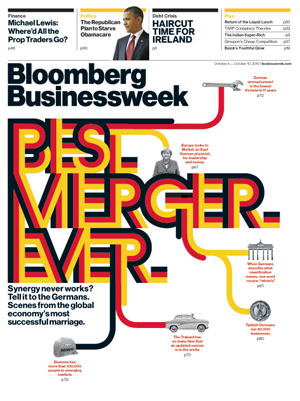
How much of this readership is in Europe? Journalism.co.uk was told that the publisher couldn't break down these figures. But perhaps that's because despite a new commitment to more European coverage, the title very much sees itself as addressing a globalised business audience.
"I think that business people are way in front of journalists in understanding that we're in a globalised world. Business people have known that - whether its because of their supply chains or their communications - for a decade or a decade plus," editor of Bloomberg Businessweek Josh Tyrangiel, a former editor of Time.com, tells Journalism.co.uk.
"Most journalists still feel 'hey, it's a globalised world!' But our readers already know that and so any additional knowledge we can provide to them about what it's like doing business in these [European] countries is incredibly valuable. We remove the exclamation point from that coverage."
The title has recently embarked on a series of in-depth, European country reports, starting with a focus on Germany as it celebrates the 20th anniversary of reunification. Bloomberg's existing network of international bureaux and journalists has put Businessweek in a strong position to be able to offer this level of coverage online, in print, on TV and potentially via mobile, if the story works for each platform, says Tyrangiel.
 For the Germany report, 60 Bloomberg news correspondents in six German bureaux contributed and Tyrangiel says he has been gratified by the ideas and on-the-ground knowledge available for European coverage from Bloomberg's 146 bureaux across 72 countries, employing 2,300 news and multimedia professionals.
For the Germany report, 60 Bloomberg news correspondents in six German bureaux contributed and Tyrangiel says he has been gratified by the ideas and on-the-ground knowledge available for European coverage from Bloomberg's 146 bureaux across 72 countries, employing 2,300 news and multimedia professionals."When you have digital distribution in many ways it gives you all sorts of new freedoms, to either target new countries or new language editions as you go forward. But those are mediums and what's most important are the message that you've got. we have this opportunity to do great, great stories that I wouldn't say are localised but that have local knowledge in them and so we're going to continue to push that advantage," says Tyrangiel.
While the country reports, which will continue into 2011, are part of planned focus on European matters, Tyrangiel says more attention has been paid to the continent simply because of the recent news agenda, with globally significant stories such as the crisis in Greece.
What Businessweek has to do to attract readers with its European coverage, as with any of its content, is occupy a space between the mainstream and the niche, he explains.
"We don't always want to be in the middle of it [the mainstream] ... a way to take things that people don't know and introduce it to the mainstream," he says.
"We are a business magazine and a lot of that is about defining the borders of what you cover - not just for your readers, but for your staff, so that they understand the kind of stories we pursue. The way that the media world's been shaking out, there's a lot more white space than there was before. That's to do with the failure of other things and the credited publications, including Businessweek, who have figured out what we own. We're going to fight to the borders of that and we're going to let other people do the other things.
"Once you define what you are, it's about executing that on every story you deliver."
Free daily newsletter
If you like our news and feature articles, you can sign up to receive our free daily (Mon-Fri) email newsletter (mobile friendly).
Related articles
- Bloomberg Media and Puck's subscription strategy: 'wake up the sleepers and prioritise the keepers'
- From Reuters to The New York Times, Big Oil pays 'most trusted media brands' to push greenwashing
- Newsrewired special: Angie Lau, founder of Forkast.News, on developing a business mindset
- Subscription strategy lessons from The Atlantic, Bloomberg and Business Insider
- Bloomberg Media invests in climate reporting, launches new brand









